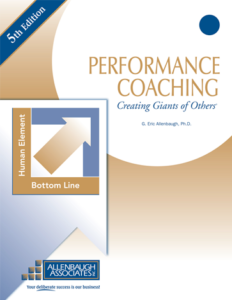Coaching Overview
who has made a significant difference in the way I lead people.
Seldom has one person so positively influenced
the culture of an organization.”
— Jim Boyle, Hospital CEO & Board Chair
Performance Coaching Overview
Think about this: less than 5% of managers and employees in Corporate America believe their talents and skills are being used at the optimum level. What opportunities arise for you in the remaining 95% of dormant human capital? With that in mind…
- Are you fully utilizing the resources of your associates?

- Are you achieving the bottom line results you seek while building a success-oriented, fulfilling work culture?
- Are your associates fully engaged and committed to a clearly defined set of mission, vision, and values?
- Are your employees taking full accountability for their performance and consciously upgrading their talents and abilities?
- Are you clearly and directly addressing the performance issues of your associates?
- Are you sustaining your competitive edge through effective development of your human resource talent?
Managers teach others how to perform, either directly or indirectly, either intentionally or unintentionally. In fact, managers in many organizations teach employees to perform poorly by not clarifying direction and expectations, not coaching others to bring out their best, not reinforcing good performance, and not confronting poor performance. Employees learn that just going through the motions of showing up for work entitles them to a paycheck. Productivity and quality performance seem to take a subordinate position. Under these conditions, management promotes mediocrity — and then wonders why they lost their competitive edge to their competitors!
In a study of executives conducted by Manchester Inc. of Jacksonville, Florida, participants estimated that coaching yielded a return of 5.7 times their initial investment. 77% agreed that coaching helped improve their working relationships with direct reports, 71% with immediate supervisors, and 63% with peers. Job satisfaction improved for 61% of respondents. (HR Magazine, March 2001, Vol. 46, No. 3) Coaching provides a cost-effective method of reconnecting with employees and linking individual with organizational interests.
Coaching provides a remarkably high Return-On-Investment, yet many managers essentially ignore the potential value of this important resource. And when managers do “coach,” however, they often limit their efforts to those who have difficulties on the job. The best performers — those who ironically can benefit the most from coaching — are often ignored. Managers often erroneously believe that good performers don’t need coaching and therefore spend eighty percent of their efforts on the poorest performers. Who gets the most coaching attention in your organization — your best or your poorest performers?
To learn more about how coaching can make a positive, significant, long-term difference in your organization, click on the following options.
if you will just help enough other people get what they want.”
— Zig Ziglar






